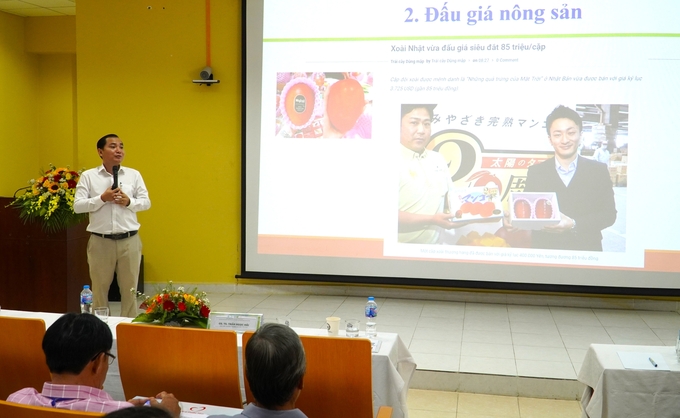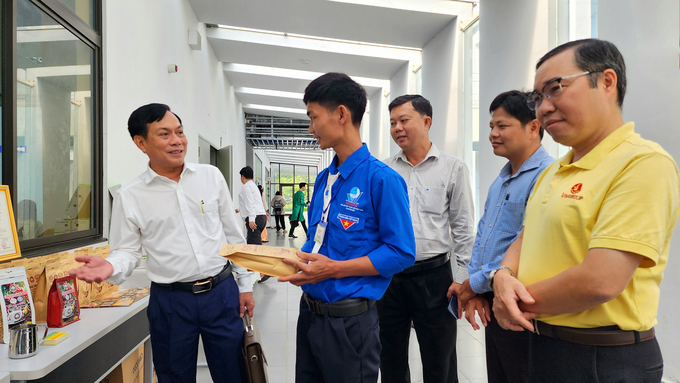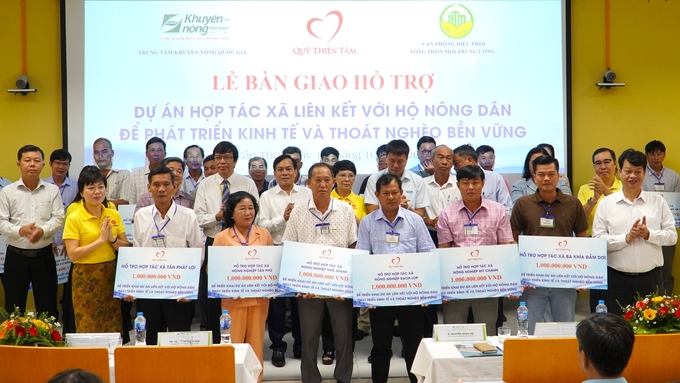November 23, 2025 | 00:59 GMT +7
November 23, 2025 | 00:59 GMT +7
Hotline: 0913.378.918
November 23, 2025 | 00:59 GMT +7
Hotline: 0913.378.918
The National Agricultural Extension Center and the Central Coordination Office for New Rural Development, in collaboration with Can Tho University and Thien Tam Foundation (Vingroup), recently organized a handover and training program in Can Tho City for cooperative leaders and agricultural extension officers from 15 southern provinces and cities.
The training program, which spanned from October 15 to October 18, saw the participation of 150 key officials and agricultural extension officers from 40 cooperatives across Binh Phuoc, Dong Nai, Long An, Tien Giang, Dong Thap, Ben Tre, Vinh Long, An Giang, Bac Lieu, Ca Mau, Kien Giang, Soc Trang, Tra Vinh, Hau Giang, and Can Tho City.

Experts from Can Tho University conducting a capacity-building training program for cooperative leaders and agricultural extension officers. Photo: Kim Anh.
The training program covered seven key topics, with a focus on effective and lawful cooperative management, skills in market analysis and opportunity identification, product positioning strategies, packaging design, communication and promotion techniques. Additionally, the program provided guidance on the sale of products through e-commerce platforms and social media, and financial management models.
This training is part of the project "Cooperatives Partnering with Farmers to Develop Economies and Achieve Sustainable Poverty Reduction," sponsored by the Thien Tam Foundation since 2022.
The project aims to enable all participating cooperatives to develop circular economy models with diverse production activities, ranging from crop and livestock production to processing. Consequently, this initiative will create a sustainable production chain in association with environmental protection. On the other hand, the project aims to enhance the capacity of key cooperative leaders and agricultural officers by organizing short-term training courses in collaboration with leading educational institutions.

Two cooperatives in Can Tho City have received support from the project "Cooperatives Partnering with Farmers to Develop Economies and Achieve Sustainable Poverty Reduction." Photo: Kim Anh.
Tran Nhat Lam, Deputy Chief of the Central Coordination Office for New Rural Development, expressed hope that with the support of the project, local cooperatives will become exemplary models that promote successful agricultural practices in their regions, thereby making significant contributions to the new rural development movement.
Moving forward, the project will continue implementing advanced training programs for agricultural extension officers. Subsequently, they will become agricultural experts capable of applying new techniques and scientific advancements into practical production, thereby supporting cooperative operations more effectively.
During the training program, the Thien Tam Foundation provided interest-free loans to 24 cooperatives in southern provinces, each receiving 1 billion VND with a maximum repayment period of 10 years. Accordingly, cooperatives will repay 50% of the loan in the first five years, with full repayment within the following five years.
Phan Thu Huong, Vice Chair of the Thien Tam Foundation's Board of Management, noted that the transition from traditional support for individual households to direct support for cooperatives can generate economic results in a shorter timeframe, ensuring stable incomes for impoverished households immediately following their participation in the project.
Moreover, the project enhances the capacity of local resources through collaboration with various levels of government, industries and technical agencies to provide agricultural production techniques and market access for products, enabling households to achieve sustainable poverty reduction.

Cooperatives that are eligible for the 1 billion VND interest-free loans have committed to creating additional stable jobs for the impoverished and disadvantaged households within their areas. Photo: Kim Anh.
After the cooperatives fully repay their loans, the project will reinvest the capital into other potential agricultural models or prioritize the allocation of funds for public welfare projects in local communities.
The Thien Tam Foundation plans to continue collaborating with the National Agricultural Extension Center and the Central Coordination Office for New Rural Development to support exemplary agricultural cooperatives in the following years. Accordingly, the Foundation's future projects will focus on cooperatives that participate in the "Sustainable Development Project for one million hectares of specialized, low-emission high-quality rice in association with green growth in the Mekong Delta region by 2030."
To date, the project "Cooperatives Partnering with Farmers to Develop Economies and Achieve Sustainable Poverty Reduction" has been implemented across 171 cooperatives in 40 provinces and cities nationwide. Among the implemented areas, 69 cooperatives have been selected as exemplary models and provided with equipment, machinery, materials, seedlings, and livestock to improve their operations.
Translated by Nguyen Hai Long

(VAN) Results from the Sustainable Durian Model Project in Dak Lak have confirmed the critical role of Yara Viet Nam in transferring advanced nutritional solutions to farmers.

(VAN) In Tuyen Quang province, livestock farmers have introduced effective models and innovative practices that significantly strengthen African Swine Fever prevention and control efforts.

(VAN) This is the study conducted by IRRI and Can Tho University on the rice straw value chain in Mekong Delta showing an economic potential of more than 6.6 trillion VND/year.

(VAN) By participating in cooperative economics, many farmers in Tay Ninh have overcome hardship, mastered clean dragon fruit cultivation techniques.

(VAN) The crossbreeding program in the former Binh Dinh province (now part of Gia Lai) has shown signs of decline, and urgent measures are needed to revive it and sustain past achievements.

(VAN) The agricultural sector agreed on a roadmap to pilot the MRV protocol and expand low-emission rice production from the 2025-2026 winter-spring crop.

(VAN) Agricultural extension officers in Quang Ninh do more than transmit knowledge; they have become a steadfast support system for farmers on the path to sustainable agricultural development.